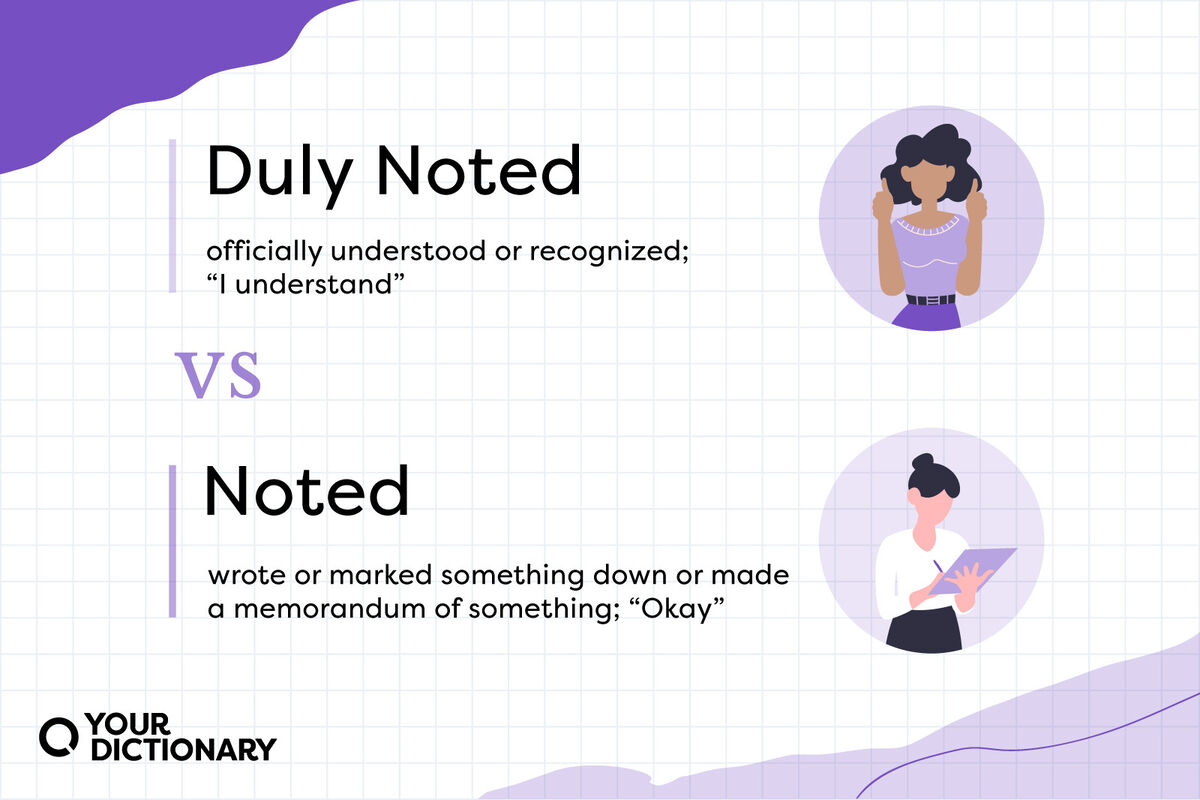
It’s the late afternoon on a workday. You’ve had a rough, busy day, but you’re stuck in a meeting. The room is just warm enough to leave you naturally dozing off when your manager asks, “Did you understand what I just said?” Instead of a simple yes, you go with duly noted. Did you say the right thing? Did you make your manager proud?
What Does “Duly Noted” Mean?
Let’s break this one down. Duly (pronounced “DOO-lee”) is an adverb that means “in a correct or appropriate manner; rightfully; at the right time.”
- She was the duly appointed queen of these lands.
- I duly manicured my dog’s very sensitive paws.
Combine duly with noted, and you get what essentially means “officially understood or recognized.”
- My parents duly noted my complaints about going to bed early but made no plans to change my schedule.
- Our boss confirmed that all of our suggestions and requests had been duly noted.
Some people say duly noted on its own as an equivalent to “I understand” or “I acknowledge what you just said” or even more simply “I received your communication.”
- “Could you please take out the trash at the end of the day?” “Duly noted.”
- “The quarterly report showed some room for improvements, Jerry.” “Duly noted!”
How To Spell “Duly Noted”
Spelling duly noted is naturally pretty difficult for anyone. Duly isn’t really a word you hear too often in modern life, especially on its own. Many people accidentally spell it dully noted. Dully (the adverb form of dull) means “done in a boring or uninteresting manner,” so dully noted would mean you jotted something down in a really bored or disinterested way.
Duely is another common misspelling. It makes logical sense. Duly technically comes from the word due, so following the general rules for creating an adverb, you might add an -ly to the end of that and get the incorrect duely.
What Does “Noted” Mean?
Noted (pronounced “no-tid”) has a few different meanings, though if you’re saying just noted or duly noted, you probably mean it in its verb form. To note something means “to write or mark something down or make a memorandum of something.” Noted is the past tense of that.
- She noted the way his mood improved almost immediately after eating lunch.
- The teacher noted the student’s trouble with fractions and asked them to stay after class for some extra help.
It can also be said on its own to acknowledge what someone said, essentially equivalent to saying okay.
- “Could you remember to feed the dog and order pizza for dinner?” “Noted!”
- “I recommend that you drink some water before you head outside today.” “Noted!”
“Duly Noted” vs. “Noted”: Which Is More Polite?
Neither duly noted nor noted is necessarily rude or impolite per se. If you are in a work situation where you are actually recording something and the speaker asks if you got it, you can say noted or duly noted, and it shouldn’t be a problem.
However, as with most English, it all comes down to tone, and getting the right tone across can be difficult when you’re only working with one or two words. If you’re responding to an email with just noted or duly noted, it can come off as a little too terse, which can be interpreted as rudeness.
It’s similar to responding to a text with just k. Not even ok or okay. Just k.
Using “Duly Noted” or “Noted” in Texts, Emails, and Conversations
You can and should by all means use noted and duly noted if they feel right. It almost always works best in real life conversations, especially at work. Duly noted already has a level of formality built into it, and in the fast-paced business world, a short response like that might be welcome.
In any sort of written correspondence (texts, instant messaging, emails), noted and duly noted get a bit more complicated. You can’t really control your tone through written correspondence (if you can, you’re some sort of amazing wizard), so duly noted is more likely to sound a little too short or blunt.
If you do use duly noted or noted in writing and you don’t mean it in a rude way, make sure to follow up with something else after. Even a simple “thanks!” will help to take away any edge.
Using “Duly Noted” or “Noted” Sarcastically
Of course, there are times when you’re using the short response of duly noted or noted on purpose as a sarcastic remark. Used sarcastically, duly noted or noted basically acknowledges that you heard and understood someone without actually caring about what they might have said.
It’s okay if you do use duly noted or noted sarcastically, but if you’re talking to someone who doesn’t know you like that, it might come off as rude.
Alternatives to “Duly Noted” or “Noted”
If you want to acknowledge what someone said in a way that sounds more natural, you thankfully have a lot of options in your arsenal. Any variation of okay works, but if you want something more substantial:
- Got it!
- Gotcha!
- Understood.
- You got it.
- Very well.
- Message received!
- Confirming this.